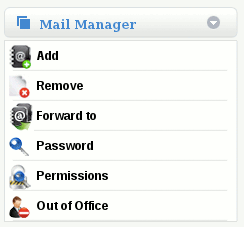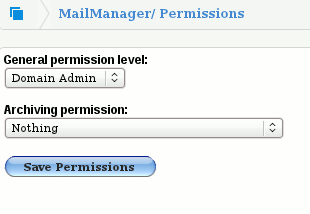Difference between revisions of "Understanding Permissions in MailWall"
Jump to navigation
Jump to search
| (19 intermediate revisions by the same user not shown) | |||
| Line 3: | Line 3: | ||
*Users can have permissions assigned to them which control the level of access they have when they access the MailWall dashboard. | *Users can have permissions assigned to them which control the level of access they have when they access the MailWall dashboard. | ||
| − | '''Permissions''' is located under Mail Manager once you have selected the '''user''' on the top navigation bar. | + | '''Permissions''' is located under Mail Manager on the side menu, once you have selected the '''user''' on the top navigation bar. |
| + | |||
| + | [[File:TopNavUser.gif]] | ||
[[File:Mail ManagerUser.gif]] | [[File:Mail ManagerUser.gif]] | ||
| − | + | Types of Permissions | |
| + | |||
* '''Nothing (Default for new users) None'''. | * '''Nothing (Default for new users) None'''. | ||
** The user has no access to any MailWall functions. | ** The user has no access to any MailWall functions. | ||
| Line 17: | Line 20: | ||
** The user can access the MailWall dashboard and manage functions associated with any user for that domain name except the viewing of archived emails. | ** The user can access the MailWall dashboard and manage functions associated with any user for that domain name except the viewing of archived emails. | ||
| − | * ''' | + | * '''Partner Admin (Note 1.)''' |
| − | ** This user has | + | ** The user can access the MailWall dashboard and manage functions for all domains on the partner account. |
| + | |||
| + | |||
| + | '''Note 1.''' This permission is only available for full MailWall Partner accounts. | ||
| + | |||
| + | You can change level of permissions in the provided drop down menu's and then clicking on '''Save Permissions''' | ||
| + | |||
| + | |||
| + | [[File:Permission.gif]] | ||
| + | |||
| + | == Different Archive Permissions == | ||
| + | |||
| + | *'''Nothing''': | ||
| + | |||
| + | The user has no archive permissions. | ||
| + | |||
| + | *'''View archived messages''': | ||
| + | |||
| + | The user can view archived messages. | ||
| + | |||
| + | *'''View or release archived messages''': | ||
| + | |||
| + | The user can view or release archived messages. | ||
| − | * ''' | + | *'''View, release or redirect archived messages''': |
| − | |||
| + | The user can view, release or redirect archived messages. | ||
| − | |||
| − | |||
[[Category:MailWall]] | [[Category:MailWall]] | ||
Latest revision as of 17:04, 2 March 2012
Understanding Permissions in MailWall?
- Users can have permissions assigned to them which control the level of access they have when they access the MailWall dashboard.
Permissions is located under Mail Manager on the side menu, once you have selected the user on the top navigation bar.
Types of Permissions
- Nothing (Default for new users) None.
- The user has no access to any MailWall functions.
- Normal User
- The user can access the MailWall dashboard and manage functions associated with email addresses associated with their username.
- Domain Admin
- The user can access the MailWall dashboard and manage functions associated with any user for that domain name except the viewing of archived emails.
- Partner Admin (Note 1.)
- The user can access the MailWall dashboard and manage functions for all domains on the partner account.
Note 1. This permission is only available for full MailWall Partner accounts.
You can change level of permissions in the provided drop down menu's and then clicking on Save Permissions
Different Archive Permissions
- Nothing:
The user has no archive permissions.
- View archived messages:
The user can view archived messages.
- View or release archived messages:
The user can view or release archived messages.
- View, release or redirect archived messages:
The user can view, release or redirect archived messages.

